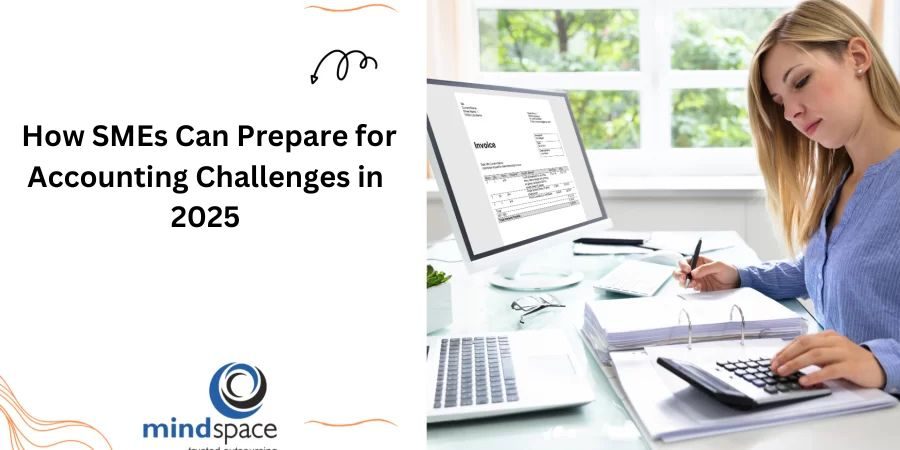How SMEs Can Prepare for Accounting Challenges in 2025
Small and Medium Enterprises (SMEs) play a crucial role in the global economy, but they often face unique challenges when it comes to managing their finances. As we approach 2025, the accounting landscape is evolving rapidly with the integration of new technologies, regulatory changes, and shifting financial trends. For SMEs, navigating these changes effectively is essential for ensuring business stability and growth. In this blog, we’ll explore the top accounting challenges SMEs are likely to face in 2025 and offer actionable steps to prepare for them.
Must Read : Top Year-End Close Tips for Businesses
Adapting to Technological Advancements
As the accounting industry continues to embrace automation, artificial intelligence (AI), and machine learning, SMEs must adapt to these technological innovations. Tools like cloud accounting software, AI-driven financial management systems, and robotic process automation (RPA) are becoming mainstream, but they require an initial investment of time and resources.
How SMEs Can Prepare:
- Invest in cloud-based accounting solutions to streamline processes, reduce manual errors, and improve real-time financial visibility.
- Train your accounting team to be proficient with new technologies to ensure smooth transitions and better decision-making.
Navigating Complex Tax Regulations
Tax regulations are constantly evolving, and with new rules introduced regularly, staying compliant can be a significant challenge for SMEs. From VAT updates to income tax policy changes, failure to adapt to new regulations can result in costly penalties and business disruptions.
How SMEs Can Prepare:
- Stay informed about upcoming tax reforms in your region and industry.
- Consider partnering with tax professionals or outsourcing tax-related tasks to ensure compliance.
- Use accounting software that is regularly updated to handle the latest tax changes automatically.
Suggested Read : The Ultimate Guide to Business Financial Software
Managing Cash Flow and Profitability
Cash flow remains one of the top accounting challenges for SMEs. Ensuring there is enough cash on hand to cover operational costs, pay suppliers, and invest in business growth is essential for long-term success. With fluctuating market conditions and unpredictable economic factors, managing cash flow can be a tricky balancing act.
How SMEs Can Prepare:
- Implement strict cash flow forecasting and budgeting practices to stay on top of your finances.
- Use accounting software that can help predict cash flow trends and set reminders for payments and receivables.
- Maintain a strong relationship with your financial institutions to secure funding options if necessary.
Data Security and Fraud Prevention
As more businesses move their financial records online, the risk of data breaches and cyber-attacks increases. SMEs are prime targets for fraud due to the often limited security infrastructure in place. Protecting sensitive financial data is crucial to prevent financial losses and reputational damage.
How SMEs Can Prepare:
- Invest in robust cybersecurity measures, including encryption, firewalls, and secure accounting platforms.
- Educate your employees about the importance of data security and implement strict internal controls.
- Regularly audit your financial systems and transactions to detect any signs of fraud early.
Suggested Read : Double-Entry Bookkeeping: Timeless Principles, Modern Finance
Dealing with Increased Regulatory Compliance
The rise of global trade and expanding markets has led to stricter regulatory requirements, especially when it comes to financial reporting and compliance. From adhering to international accounting standards (IFRS) to meeting local compliance regulations, SMEs are tasked with navigating a complex regulatory environment.
How SMEs Can Prepare:
- Keep up with industry regulations and financial reporting requirements by subscribing to industry news or working with a compliance consultant.
- Consider outsourcing accounting tasks to ensure professional handling of compliance-related issues.
- Regularly review and update your internal accounting processes to maintain accuracy and transparency in reporting.
Scaling and Managing Growth
As SMEs expand, they face the challenge of scaling their accounting processes to keep up with business growth. Managing multiple revenue streams, increasing transaction volumes, and expanding to new markets can overwhelm traditional accounting systems.
How SMEs Can Prepare:
- Invest in scalable accounting systems that can grow with your business.
- Consider outsourcing certain accounting functions to free up resources for strategic growth.
- Plan ahead for the financial implications of business expansion, including funding, new tax obligations, and increased operational costs.
Suggested Read : Smart Moves for Year-End Tax Planning For Individuals 📆💡
Shortage of Skilled Accounting Professionals
There is an ongoing shortage of skilled accounting professionals, particularly in smaller markets. SMEs often struggle to recruit and retain qualified accounting talent, which can lead to delays, errors, and inefficiencies in financial management.
How SMEs Can Prepare:
- Consider outsourcing accounting services to trusted third-party providers who can handle your financial management needs.
- Offer competitive compensation packages and professional development opportunities to attract and retain top talent in your accounting team.
- Use automated accounting tools to reduce reliance on manual processes and ensure consistency in financial reporting.
Suggested Read : Advantages of Payroll Outsourcing
Conclusion
As SMEs move into 2025, addressing the top accounting challenges will be vital for their continued success. By embracing technology, staying compliant with changing regulations, and preparing for the evolving demands of financial management, small businesses can ensure that they remain resilient and competitive in a rapidly changing marketplace. Proactive preparation is key to turning these challenges into opportunities for growth and efficiency.
By taking the steps outlined above, SMEs can set themselves up for success in 2025 and beyond, paving the way for a financially stable and prosperous future.


